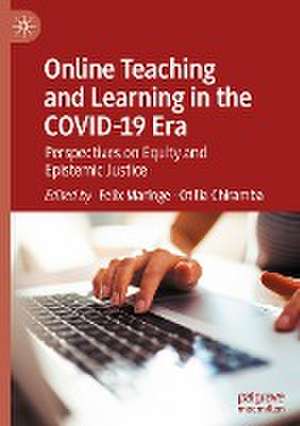Online Teaching and Learning in the COVID-19 Era: Perspectives on Equity and Epistemic Justice
Editat de Felix Maringe, Otilia Chirambaen Limba Engleză Hardback – 30 noi 2023
Preț: 892.28 lei
Preț vechi: 1088.15 lei
-18% Nou
Puncte Express: 1338
Preț estimativ în valută:
170.74€ • 176.14$ • 142.48£
170.74€ • 176.14$ • 142.48£
Carte tipărită la comandă
Livrare economică 26 martie-09 aprilie
Preluare comenzi: 021 569.72.76
Specificații
ISBN-13: 9783031424014
ISBN-10: 3031424018
Pagini: 255
Ilustrații: XVII, 255 p. 8 illus., 7 illus. in color.
Dimensiuni: 148 x 210 mm
Greutate: 0.48 kg
Ediția:1st ed. 2023
Editura: Springer International Publishing
Colecția Palgrave Macmillan
Locul publicării:Cham, Switzerland
ISBN-10: 3031424018
Pagini: 255
Ilustrații: XVII, 255 p. 8 illus., 7 illus. in color.
Dimensiuni: 148 x 210 mm
Greutate: 0.48 kg
Ediția:1st ed. 2023
Editura: Springer International Publishing
Colecția Palgrave Macmillan
Locul publicării:Cham, Switzerland
Cuprins
CHAPTER 1: RETHINKING HYBRID TEACHING IN THE SOUTH AFRICAN HIGHER EDUCATION SYSTEM: PROMOTING EQUITY AND EPISTEMIC JUSTICE.
CHAPTER 2: DIGITAL EDUCATION ECOSYSTEM TO ACHIEVE INSTRUCTIONAL EQUITY & COGNITIVE JUSTICE
CHAPTER 3: STREAMING CONTENT ONLINE AND SUPPORTING INITIAL TEACHER EDUCATORS DURING COVID-19 PANDEMIC
CHAPTER 4: THE IMPERATIVES FOR DISADVANTAGED STUDENTS SUPPORT IN HE IN THE COVID-19 AND POST COVID-19 ERA
CHAPTER 5: PSYCHOLOGICAL BARRIERS ON ADJUSTMENT TO ONLINE TEACHING AND LEARNING IN UNIVERSITIES DURING COVID-19 PANDEMIC: A SOCIAL JUSTICE PERSPECTIVE
CHAPTER 6: DIGITAL REVOLUTION IN HIGHER EDUCATION IN THE COVID-19 AND POST COVID-19 ERA
CHAPTER 7: AN ANALYSIS OF COVID-19 RELATED FACTORS THAT AFFECT THE GIRL-CHILD’S ACCESS AND PARTICIPATION IN EDUCATION
CHAPTER 8: MANAGING CHANGE FROM FACE-TO-FACE TO ONLINE TEACHING AND LEARNING IN HIGHER EDUCATION DURING THE COVID-19 PANDEMIC: IMPLICATIONS FOR EQUITY AND EPISTEMIC JUSTICE
CHAPTER 9: PROTECTIVE FACTORS FOR ADJUSTMENT TO ONLINE TEACHING DURING COVID-19 PANDEMIC: A SOCIAL JUSTICE PERSPECTIVE
CHAPTER 10: TEACHING AND LEARNING IN HIGHER EDUCATION IN THE POST-COVID-19 ERA: A PROSPECTIVE VIEW.
Notă biografică
Felix Maringe is Professor in Higher Education and Leadership at the University of Kigali, Rwanda.
Otilia Fortunate Chiramba is a research fellow at the University of Johannesburg, South Africa.
Otilia Fortunate Chiramba is a research fellow at the University of Johannesburg, South Africa.
Textul de pe ultima copertă
This book examines the ongoing changes initially caused by the COVID-19 pandemic and the future prospects of teaching and learning in higher education institutions. It focuses on the impact of online education on issues of learning equity and epistemic justice. The transition from traditional face-to-face teaching to remote learning has exacerbated existing inequalities in epistemological access among higher education students, despite the shortcomings of the former in this regard. The book features essays by African academics who reflect on the challenges of epistemological access during the sudden shift to hybrid, blended and remote teaching and learning. It specifically explores the question of equitable learning in diverse home contexts, drawing on both theoretical and empirical studies conducted by the authors in South African universities and the region. The chapters employ the conceptual framework of epistemic injustice to define and explore various forms of such injustice, providing a basis for analyzing the implications of the transition to online pedagogy.Felix Maringe is Professor in Higher Education and Leadership at the University of Kigali, Rwanda.
Otilia Fortunate Chiramba is a research fellow at the University of Johannesburg, South Africa.
Otilia Fortunate Chiramba is a research fellow at the University of Johannesburg, South Africa.
Caracteristici
Provides an in-depth analysis of Covid-19's impact on higher education
Explores a unique African perspective on equity in online learning
Applies an epistemic injustice framework to analyse implications of the transition to online pedagogy
Explores a unique African perspective on equity in online learning
Applies an epistemic injustice framework to analyse implications of the transition to online pedagogy
